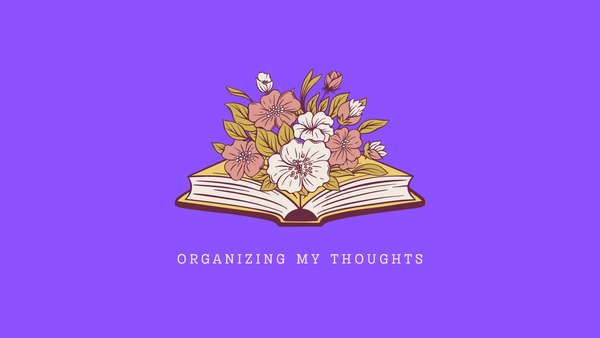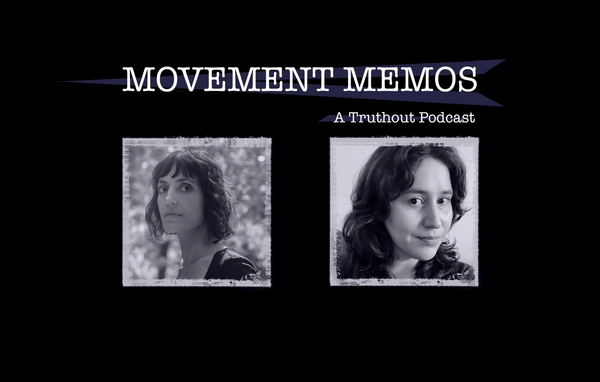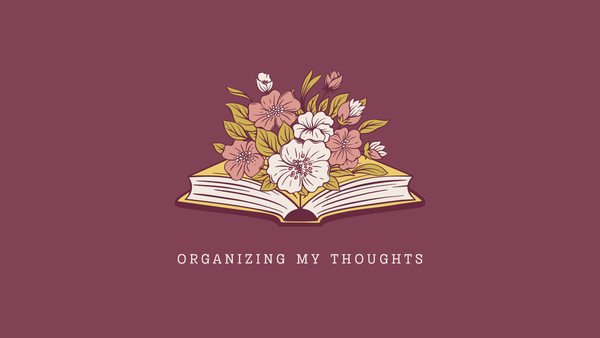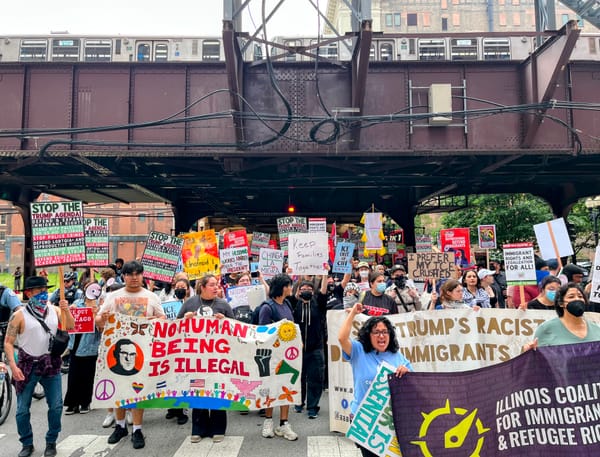Must-Reads and the Work of Solidarity
From bail funds to robodogs, bluetooth surveillance, and antifascism after Gaza, here are some important stories you may have missed recently.

Greetings friends,
This is my first must-read list since being away on medical leave, so we have a lot of ground to cover. But before I get to that, there’s a new episode of Movement Memos that I want to put on your radar. This week, I talked with Astra Taylor and Leah Hunt-Hendrix about how solidarity is built and deconstructed and about why outside agitators are good, actually. As I explain in the episode, “Every iteration of the outside agitator trope is grounded in the maintenance of our alienation.”I think this is an important conversation, and I hope you’ll check it out.
If you need a transcript, or you would like to check out our show notes, you can find those here.
Must-Reads
From bail funds to robodogs, bluetooth surveillance, and antifascism after Gaza, here are some important stories you may have missed recently.
Genocide Fuels Climate Crisis. The Fate of Palestine Shapes Our Climate Future. by David Klein. “The heroic struggle by Palestinians for survival is not only for themselves, but is also a part of a global struggle against a potentially horrific future for humanity as a whole.”
Looking Up an NYPD Officer’s Discipline Record? Many Are There One Day, Gone the Next. by Sergio Hernandez. “ProPublica has found the NYPD site for allowing the public to track officers’ misconduct is shockingly unreliable. Cases against officers frequently vanish from the site for days — sometimes weeks — at a time.”
How bail funds are fighting new legal attacks on solidarity by Justin A. Davis. “‘I think increasingly people are finding that it’s not about bail funds: It’s about the state wanting to criminalize community care, to remove any avenues towards freedom,’ [says Pilar Weiss].”
In Backlash to Campus Pro-Palestine Protests, Echoes of Standing Rock and the Global Crackdown on Climate Protest by Alleen Brown. “By being at Standing Rock, El-Zabri and other Palestinian activists took on the risk of being subjected to fossil fuel industry surveillance. Now, as historic antiwar protests arise across the U.S., the roles have been reversed, with environmental and Indigenous activists standing in defense of Palestinians. In this case, land defenders of all stripes will absorb the sweeping criminalization of the Palestinian cause being pushed by advocates for Israel.”
“To Be Free Is to Free Others”: Formerly Incarcerated Women Urge Decarceration by Victoria Law. “‘We have a long way to go to bring justice to all the individuals who were harmed by the ‘tough on crime,’ zero-tolerance legislation passed in the late ‘80s and early ‘90s,’ says Amy Povah, founder and director of CAN-DO Justice through Clemency, which advocates for people imprisoned on federal drug sentences.”
Add Bluetooth to the Long List of Border Surveillance Technologies by Matthew Guariglia, Cooper Quintin and Dave Maass. “This incredibly personal model of tracking is the latest level of surveillance infrastructure along the U.S.-Mexico border—where communities are not only exposed to a tremendous amount of constant monitoring, but also serves as a laboratory where law enforcement agencies at all levels of government test new technologies.”
What it’s like to be used as a human shield by the Israeli army by Qasem Waleed. “‘Of all the death scenarios I have imagined myself in since the beginning of the war, I never suspected I would see my own grave,’ the 26-year-old Khan Younis resident told Mondoweiss.”
Antifascism After Gaza by Alberto Toscano. “There is a bitter irony in granting primacy to the national fight against fascism over the campaign to stop a U.S.-funded genocide when the current Israeli government fits textbook definitions of fascism far more neatly than any other contemporary regime.”
Robot dogs armed with AI-aimed rifles undergo US Marines Special Ops evaluation by Benj Edwards. “The prospect of deploying armed robotic dogs, even with human oversight, raises significant questions about the future of warfare and the potential risks and ethical implications of increasingly autonomous weapons systems. There's also the potential for backlash if similar remote weapons systems eventually end up used domestically by police.”
Gender-Affirming Care Gave Me a Life I Love. Why Do Pundits See It as a Tragedy? by Chase Strangio. “Situating access to medical care as a ‘toxic debate’ allows a wary readership to distance themselves from their bias. The Times gives them cover to give in to their fears and abandon their critical instincts.”
Children ‘piled up and shot’: new details emerge of ethnic cleansing in Darfur by Mark Townsend. “Together, the 221 witness statements collated by Human Rights Watch offer the latest evidence that the Arab-led RSF has orchestrated a concerted 12-month campaign of ethnic cleansing against Sudan’s non-Arab Masalit tribe in West Darfur.”
Learning Together
Making a comeback after being on medical leave for over a month is tiring stuff. During the last week, I’ve been writing, recording, researching, planning new projects, and juggling calls about how to best support student organizers. The political activation of so many young people has underlined the need for political education, as new activists seek to broaden and hone their skills. My collective, Lifted Voices, which has been working to sunset since last year, has been incubating a new container: The Doing Justice Collaborative. Through the collaborative, I will be working with other movement educators to create curriculums and other resources, lead workshops, and ensure that marginalized facilitators are paid for their work. If you are part of an activist group that is looking for learning opportunities this summer, feel free to reach out. I am mostly focused on virtual efforts right now, but I will be leading some in-person workshops as well. I am very interested in working with newly activated young people, but I also recognize that strong movements are intergenerational, so I will be available to work with groups of varying ages and experience levels. If you are interested in organizing a workshop with me around direct action, organizing basics or lessons from Let This Radicalize You, you can reach out through my personal website.
Marching On
On Wednesday, I attended a Palestine solidarity march in downtown Chicago. Joe Biden was in town for a fundraiser, so we marched to the hotel where he and his funders were gathered and made noise outside. I arrived late, as traffic is always nightmarish during presidential visits. For blocks, I could hear the march, already in motion, echoing somewhere ahead of me as I scurried toward it. When I joined the group, I quickly saw one of my best friends, who immediately threw her arms around me. I was where I belonged, among the loving and the furious. As march drums echoed through our city’s most monied streets, we denounced the ongoing atrocities in Rafah. Occasionally, someone would yell, “Fuck Joe Biden,” and the crowd would cheer. At one point, a small child led chants declaring that, “From the river to the sea, Palestine will be free!” Students, whose encampments have been raided by police during the last week, rallied the crowd and condemned Biden for his role in Israel’s genocide. My body was weary and my feet ached, but I was so grateful to be there.
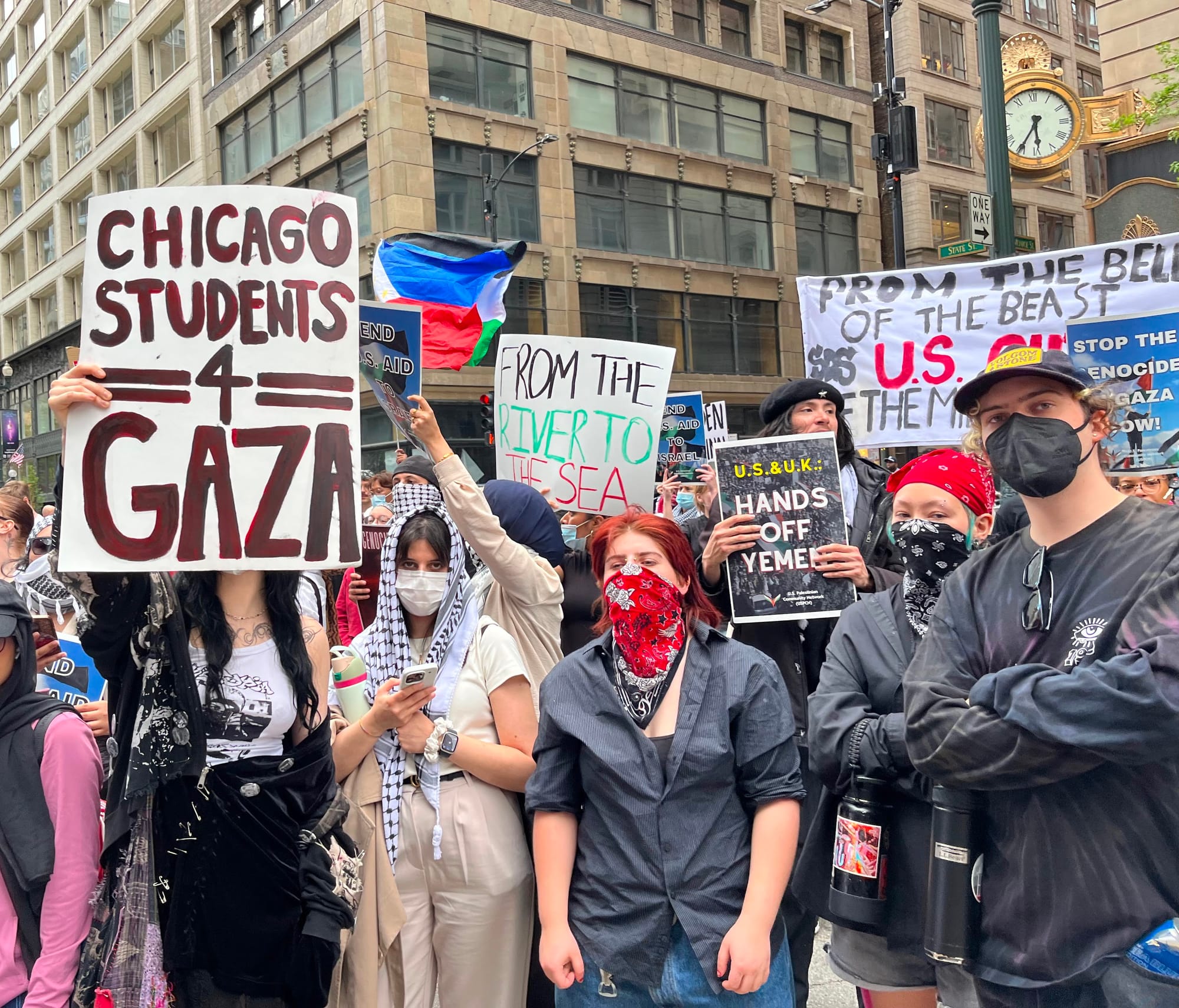
My heart has been heavy lately, as I reflect on the devastation in Palestine and how hard people of conscience have fought to stop the genocide. Thousands of people have been arrested for protesting the mass murder of over 30,000 people. Protesters have shut down streets, weapons manufacturers, and consulates. They have disrupted fundraisers, blocked boats, seized buildings and formed encampments. We have marched and we have raged and grieved together. Aaron Bushnell self-immolated, sacrificing his life so that people in the United States might understand the horror of this moment. As I watched video footage of Palestinian men trying in vain to rescue children who had been crushed by bombs in Rafah, I ached inside. None of our efforts have prevented this terror, and yet, how could we not act in the face of it?
These are heartbreaking times, but there is also hope in the air. A year ago, I could not have foreseen the sprawl of student-led Palestine solidarity encampments. Something has shifted, and I don’t think our oppressors can undo what’s begun here. A generation of young people who have inherited a burning world are becoming more radical. They have created life-affirming spaces for political exploration and relationship building, and police attacks on those spaces have only clarified their analysis. They are fighting for Palestine, and in doing so, they are fighting for us all. Will we continue to rally in this moment? Will we join these young people, arm in arm, and forge the kind of intergenerational bonds our movements desperately need? We will learn and build like our lives depend on it? I hope so. I am hurting, physically and emotionally, as I write these words, but I am also heartened by the fierce energy of recent days. We have so much to fight for. May we continue to find our courage.
Much love,
Kelly

